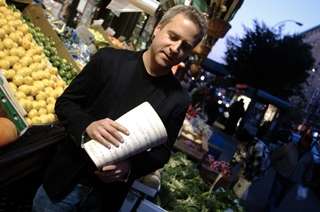|
Back
Sparkle plus depth Toronto
Koerner Hall
11/09/2014 -
Franz Joseph Haydn: Keyboard Sonata No. 60 in C Major, Hob.XVI:50
Leos Janácek: On the Overgrown Path (selections)
Franz Schubert: Ländler (selections) – Moments Musicaux No. 4 and 5, D. 780 – Grazer Galopp
Wolfgang Amadeus Mozart: Rondo in A Minor, K. 511
Robert Schumann: Carnaval, Op. 9
Jeremy Denk (piano)

J. Denk (© Dennis Callahan)
Jeremy Denk has locally attracted a degree of media attention thanks to his writings and his MacArthur “genius” award. But just how is his piano playing? The key word is “beguiling”.
The program began with an amazingly deft performance of Haydn’s mischievous Keyboard Sonata No. 60, composed in 1794-95 during his second visit to London, a period deemed to one of the most golden in his long, accomplished career. Denk gave the piece a liquid sparkle while expressing the work’s full dynamic contrasts. Note that it is called a keyboard sonata; at times the concert grand sounded like a lighter, earlier version of itself. Has anyone ever noted how much the final movement sounds like Schubert’s lively song ”Ich wollt’, ich wär ein Fisch”?
The name Schubert leads us to the second item on the program, a 35-minute interweaving of seven items from Leos Janácek’s On the Overgrown Path collections and seven or so items by Schubert, from three of the ländler collections plus Moments Musicaux numbers four and five, plus the zingy Grazer Galopp. In his introduction, Denk said he chose the works (composed about a century apart - a century, needless to say, of great musical ferment) because of similarities of mood and major-minor manipulations, full of unexpected shafts of light and dark. He used the word “fondled” in describing both composers’ handling of their chosen notes. As in the Haydn, Denk’s touch went from the feather-light to all out dramatic or playful extroversion. (It would have helped if everything he had played had been listed in the program - but such a medley ought to be open to spontaneity.)
Denk imbued Mozart’s Rondo in A Minor with melancholy from the first notes on. He gave the work an organic unity throughout its varied sections.
The program concluded with Robert Schumann’s Carnaval, composed when Schumann was 25. Considering Denk’s lively treatment of the earlier pieces on the program, it came as no surprise that he gave full character to each of the 21 sections of the suite, with an exuberant “There - take that!” finish.
The single encore was a selection from Charles Ives Sonata No. 2 (the “Concord Sonata”). The section begins with a solemn hymn-like section and then goes epic. It made one want to hear the whole piece. Maybe on his next visit? Let’s hope it’s soon.
Michael Johnson
|